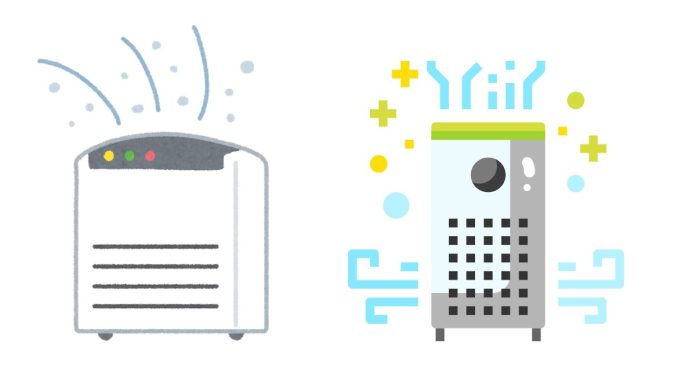Air purifiers do work, and they’re not a scam—but their effectiveness depends on a few factors, such as the type of air purifier, the quality of the filters, and the specific air quality issues you’re trying to address. Here’s a breakdown of how air purifiers work and the factors that determine whether they’re a good investment:
How Air Purifiers Work:
Air purifiers typically use a combination of filters and airflow systems to capture and remove harmful particles from the air, including dust, pollen, smoke, pet dander, mold spores, and even some bacteria and viruses.
Common Filter Types:
- HEPA Filters (High-Efficiency Particulate Air):
- What they do: These filters are capable of removing at least 99.97% of airborne particles as small as 0.3 microns, which includes most common allergens (like pollen, dust, and pet dander) and even some viruses and bacteria.
- Effectiveness: They are highly effective in improving indoor air quality, especially for people with allergies or asthma.
- Activated Carbon Filters:
- What they do: These filters adsorb gases and odors, such as cigarette smoke, cooking smells, and volatile organic compounds (VOCs) found in paints, cleaning products, and furniture.
- Effectiveness: While they don’t filter out particulate matter, they are excellent for reducing odors and chemicals in the air.
- UV-C Lights:
- What they do: Some air purifiers incorporate ultraviolet light to kill bacteria, viruses, and mold spores.
- Effectiveness: While UV-C lights can reduce microbial contaminants, they are generally less effective than HEPA filters for cleaning the air of particles. They work best in combination with other filtration systems.
- Ionizers and Electrostatic Filters:
- What they do: These purifiers use charged particles to attract and capture dust and allergens. Some ionizers release negative ions into the air to bind with dust, pollen, and smoke particles.
- Effectiveness: Ionizers are effective at capturing larger particles, but they can sometimes release ozone, which can be harmful to people with respiratory issues.
When Do Air Purifiers Work Well?
- For Allergies: If you suffer from seasonal allergies or dust/pet allergies, a good air purifier with a HEPA filter can significantly reduce your symptoms by removing allergens from the air.
- For Asthma: People with asthma may benefit from air purifiers that remove particulate matter, which can help reduce asthma flare-ups.
- For Smoke or Odors: Air purifiers with activated carbon filters are effective at removing smoke and other odors, making them useful for smokers, people living in areas with wildfire smoke, or those with cooking smells in the air.
- For Mold and Mildew: While air purifiers with HEPA filters can remove mold spores, they do not address the source of the problem (like excess moisture). You’ll need to fix the moisture issue to prevent mold growth.
Limitations of Air Purifiers:
- Not a Cure-All: Air purifiers are not a substitute for good ventilation or other forms of air quality control. They only clean the air in the room where they’re placed, and they may not be effective in large spaces or for certain types of pollution (like gases, unless you have activated carbon filters).
- Maintenance: Air purifiers require regular filter replacements to remain effective. If filters are not replaced or cleaned according to the manufacturer’s instructions, the purifier’s efficiency drops significantly.
- Noise: Some air purifiers, especially larger ones, can be noisy. While this is generally not an issue with smaller, quieter models, it can be a concern in bedrooms or living rooms where people expect minimal noise.
- Ozone Issues with Some Models: Some air purifiers, particularly those with ionizers, can generate small amounts of ozone, which can be harmful at higher concentrations. If you’re sensitive to ozone, it’s best to avoid air purifiers that generate it.
- Not Suitable for Large Spaces: If you have a very large room or an open floor plan, one small air purifier may not do much. You might need to buy larger models or multiple units.
When They Might Not Work as Well:
- Chemical Pollutants: While HEPA filters are excellent at capturing particulate matter, they don’t remove gases and chemicals unless you have an activated carbon filter. If you’re dealing with high levels of VOCs or other chemical pollutants, look for an air purifier specifically designed to handle those.
- High-Volume Pollutants (like Radon or Carbon Monoxide): Air purifiers can’t filter out radon or carbon monoxide, as these are gases that require specialized ventilation or mitigation systems.
Do Air Purifiers Really Work?
Yes, air purifiers do work—but their effectiveness depends on:
- The specific problem you’re trying to address (allergies, smoke, odors, dust, etc.)
- The type and quality of the air purifier (HEPA filters and activated carbon filters are the most effective).
- Proper maintenance (replacing filters regularly).
- Room size (make sure the purifier is rated for the size of the room it’s in).
Conclusion:
Air purifiers are not a scam; they are effective tools for improving indoor air quality, especially for specific issues like allergies, asthma, smoke, and pet dander. However, to get the best results, you need to choose the right type of air purifier for your needs, ensure proper maintenance, and understand the limitations of the device.


